Dining precincts are on the rise and here to stay
From Sydney to South Australia, hospo magnates are going all in on one-stop shops for gastronomic enthusiasts. Is it just a cash grab or the future of dining?
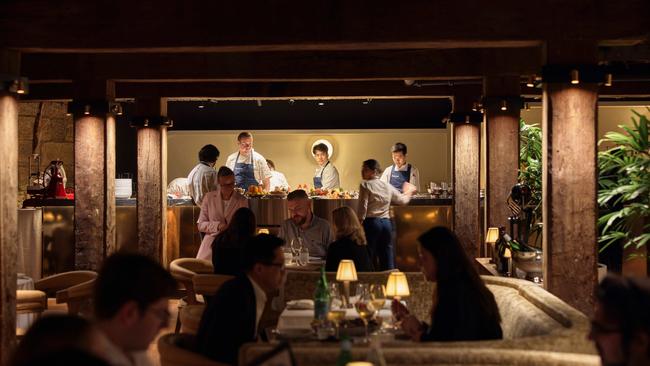
Choosing where to eat on a night out has turned into a mission these days. The prospect of making a decent reservation – or more boldly hoping to make the waitlist – is being held at ransom by proprietors wielding turns of phrase like ‘curated experiences’ or ‘immersive dining’.
Enter the rise of precinct dining.
The concept itself is nothing new but Australian hospitality groups – and developers – are going all in on its success. Despite rising cost pressures and a decrease in spending on dining, some night-life hubs remain resistant to dining precincts. Independent bars and restaurants remain the lifeblood of Sydney’s Inner West and Melbourne's Inner North. So too is true of Hobart’s largely owner-operator run hospitality scene.
In the Sydney CBD, it is an entirely different story. Hospitality stalwart Justin Hemmes, CEO of Merivale, has built an empire on Sydney’s love of precinct dining within an easy-to-navigate lifestyle hub. First opening Establishment in 2000, his George Street Ivy Precinct now spans more than 15 restaurant, bar and club venues. If anyone owns the real-life equivalent of Monopoly’s Mayfair and Park Lane, it’s Merivale.
“We’ve been great advocates of the hospitality precinct model for many years,” says Hemmes, “A diversity of venues and offerings within one site is a drawcard for those wanting choice for a range of experiences.”
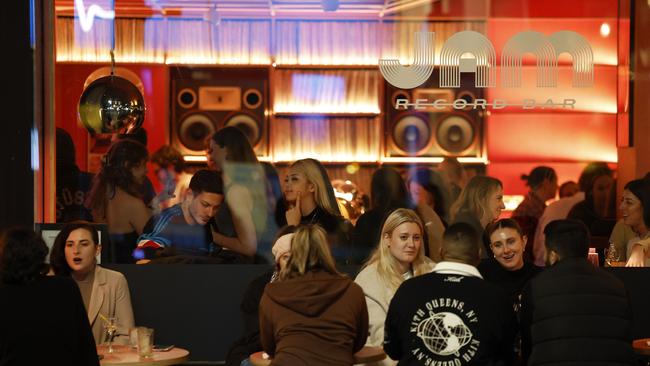
Marking a foray into Melbourne’s dining scene, Merivale recently acquired a multi-level carpark on Little Collins Street in the CBD, with plans to open the first phase of a dining precinct in Spring. Up against Andrew McConnell’s well-established Trader House venues (Gimlet, Apollo Inn, Supernormal) and Chris Lucas’s stable, Hemmes says he’s prepared to “get to know the people of Melbourne” by investing in the city.
As consumer budgets tighten due to the cost of living, so do purse strings. More diners are turning to viral social media ‘FoodTok’ trends and online restaurant reviews to guide them towards dining experiences that are worth their time and money. Chris Lucas, the restaurateur behind Chin Chin, Grill Americano (which will receive its Sydney counterpart later this year), and the recently opened Maison Bâtard precinct, acknowledges this. He says the precinct model becomes “particularly appealing in a time where people are more selective with how and where they spend”.
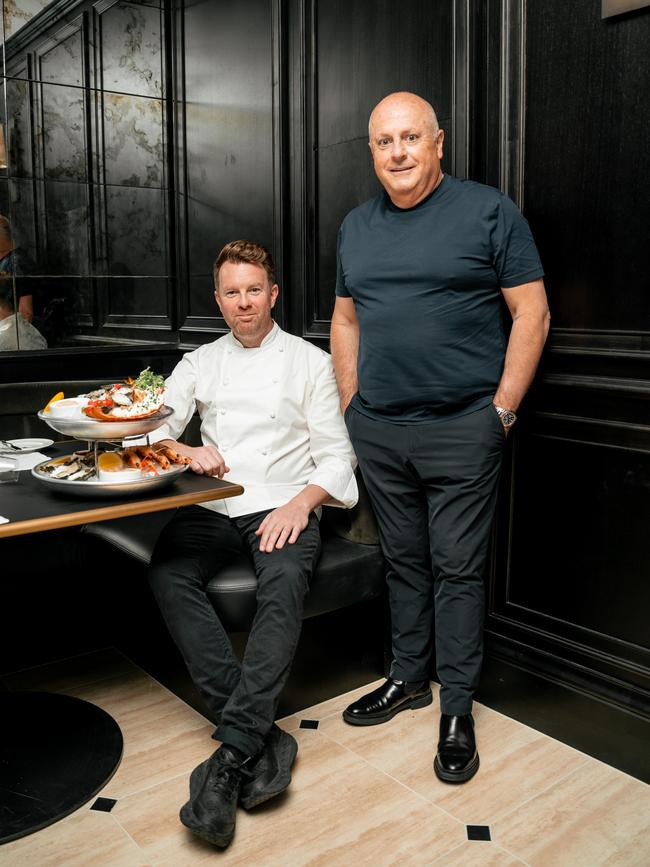
Despite cost pressures, Lucas believes diners are seeking more than just a meal out when they go to a restaurant. The multi-level dining experience at Maison Bâtard involves a cocktail bar, formal dining room and an underground club that regularly programs jazz and cabaret performances.
“We’re seeing a strong appetite for the full journey. It’s fluid and theatrical, and people really respond to that sense of occasion,” he says. “[They can] move between spaces and moods without sacrificing quality or service (or with a lot of downtime in the back of an Uber).”
Wunderlich Lane, a $500 million development by TOGA, has given Sydney’s inner-city Redfern a facelift since opening last November. The precinct is home to venues like Olympus Dining, Island Radio and Regina La Pizzeria. Also set within the precinct is the Eve Hotel, itself owned by TOGA, where hospitality group Liquid & Larder runs Bar Julius, an all-day establishment, and Mexican restaurant Lottie.
Jacob Rolls, general manager of the property developer’s hospitality arm, says the opportunity arose from diners seeking “really immersive, experience-driven environments”.
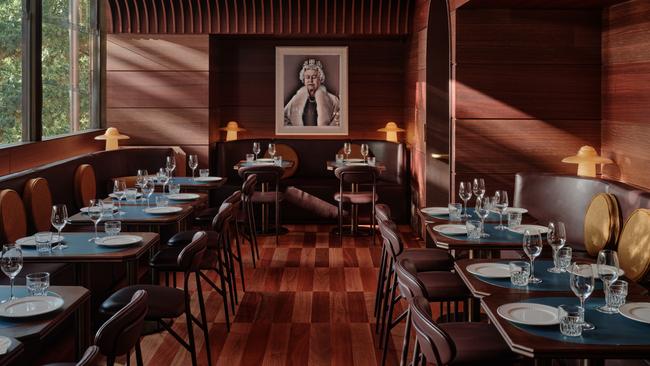
“It helps to have one owner because we can curate an offering that gives people something different to enjoy every time they come to the precinct,” he says. “The worst thing for a dining precinct is constant change in retailers so we’ve focused on a long-term, sustainable tenancy mix.”
When asked about the developer’s capacity to emulate authentic dining experiences in a precinct-style setting, Rolls says, “TOGA has always been a mixed-use precinct developer but we were really able to bring all our expertise into this site. We never want to get too involved in what the operators actually do.”
Over at The Rocks, Hunter St. Hospitality has given new life to the home of former nightclub The Argyle. The Collective, a five-venue precinct – which includes nearby Sake and The Cut – set within the harbour city’s historic sandstone buildings, also aims to create a seamless food and beverage offering. CEO Frank Tucker says this model provides a good level of retention as it gives diners “five different opportunities to dine with us”.
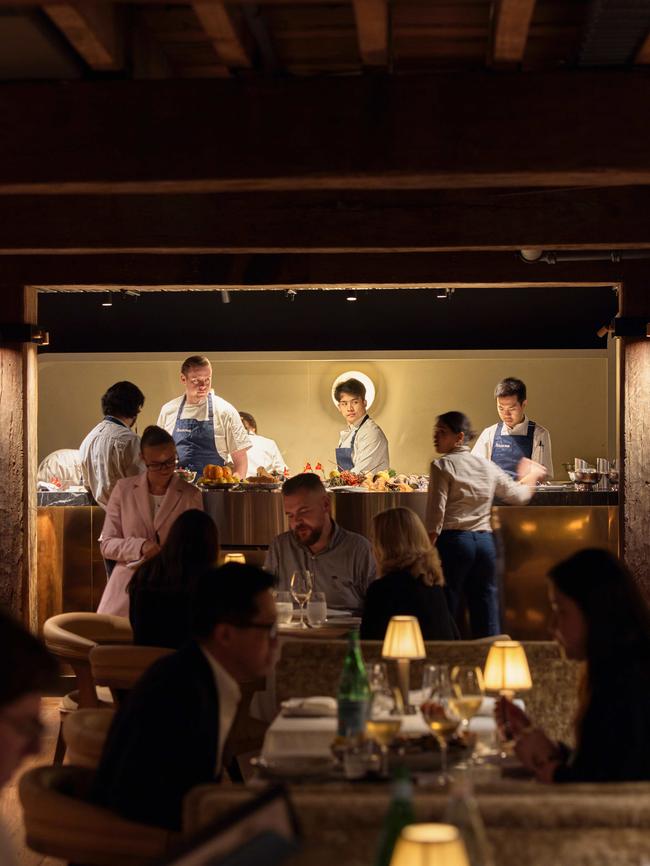
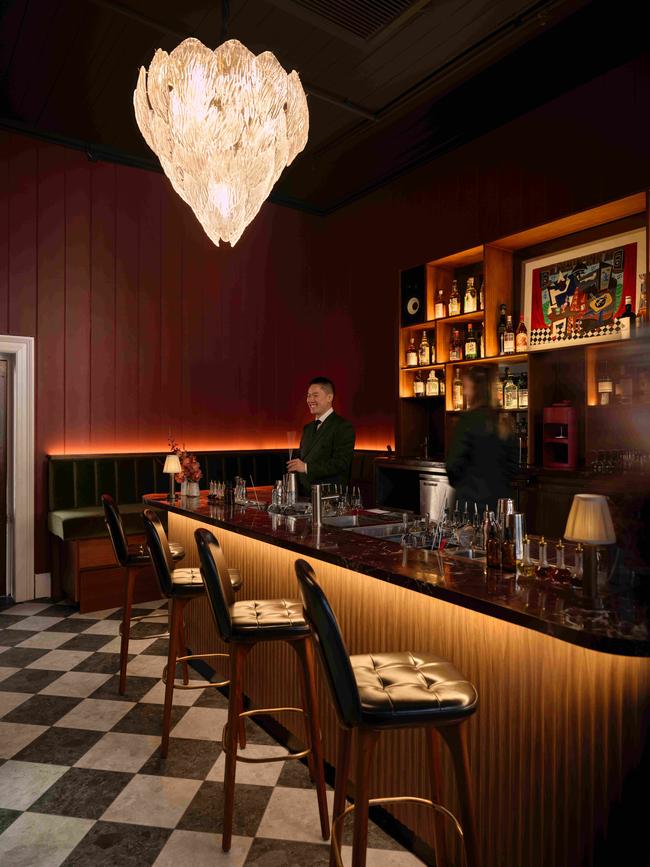
But, precinct dining is not without risks. Just last week veteran restaurateur Neil Perry made the decision to scale back operations at his Margaret Family Precinct in Double Bay, announcing the closure of cocktail bar Bobbie’s and relinquishment of the top floor of Asian diner Song Bird.
“Managing three levels as part of the restaurant proved more complex than we anticipated. Streamlining our footprint will greatly enhance our operations,” said Perry in a statement on Friday.
Around the corner, Perry’s high-end restaurant Margaret, bar Next Door, and cult bakery Baker Bleu continue to thrive.
Meanwhile, ambitious ventures are on the up in the Adelaide Hills, with former Restaurant Botanic executive chef and Noma alum Justin James taking on multi-level dining in his own right. On track to open this October, Restaurant Aptos, set within a 156-year-old church, will host 14 guests per seating through a degustation menu served across three spaces within the venue. The venture is backed by South Australian hotelier David Horbelt, who also owns luxury accommodation Mount Lofty House and Sequoia Lodge.

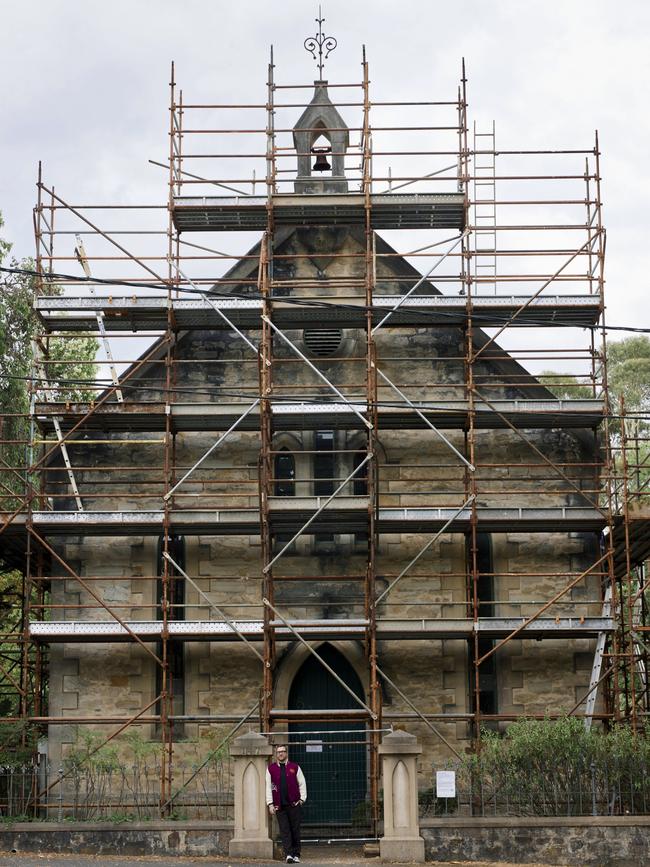
While not a precinct itself, James says he has seen an increase in consumers willing to travel for dining experiences, despite cost of living pressures. “I wanted to take that massive risk by doubling down on what I think makes a great and ambitious restaurant,” he says.
So, too, is ambition growing in Brisbane’s dining scene ahead of the 2032 Summer Olympic Games. At the helm of this growth is Anyday Hospitality, which has played a pivotal role in revitalising dining – through restaurants sAme sAme, Biànca, and nearby Honto and Agnes – in Fortitude Valley right by the luxe Calile Hotel. The group’s executive chef and co-founder Ben Williamson says “entirely different offerings” are also in the pipeline as the Olympic games “present a once-in-a-generation opportunity for Brisbane”.
Off the mainland in Hobart, the development of precincts by larger hospitality groups is yet to be seen. Independently-run venues continue to thrive within Tasmania’s dining landscape, known for its communal neighbourhood feel and frequent cross-collaboration between chefs.
One such establishment which has been embraced by locals and travellers alike is hole-in-the-wall wine bar, Sonny, in Hobart’s CBD. It is known for hosting an ever-changing roster of emerging and established chefs in its cosy kitchen. Al Robertson transitioned from manager to owner when long-time friend Matt Breen handed over the keys in 2023 to focus on Italian favourite Ogee.
Robertson says he sees “a unique sense of compassion” among owner-operated dining spots in Hobart. “The people who own restaurants and bars [near Sonny] are people I can always call on if I ever need anything. We look after each other. It’s the neighbour mentality you might not see in a big city.”
He adds: “I’m not against big setups, I just love the fact that, in a small venue, you can really try to look after everyone that walks in the door. What you get from small venues here [in Hobart] is so stunning and, often, really good value.”
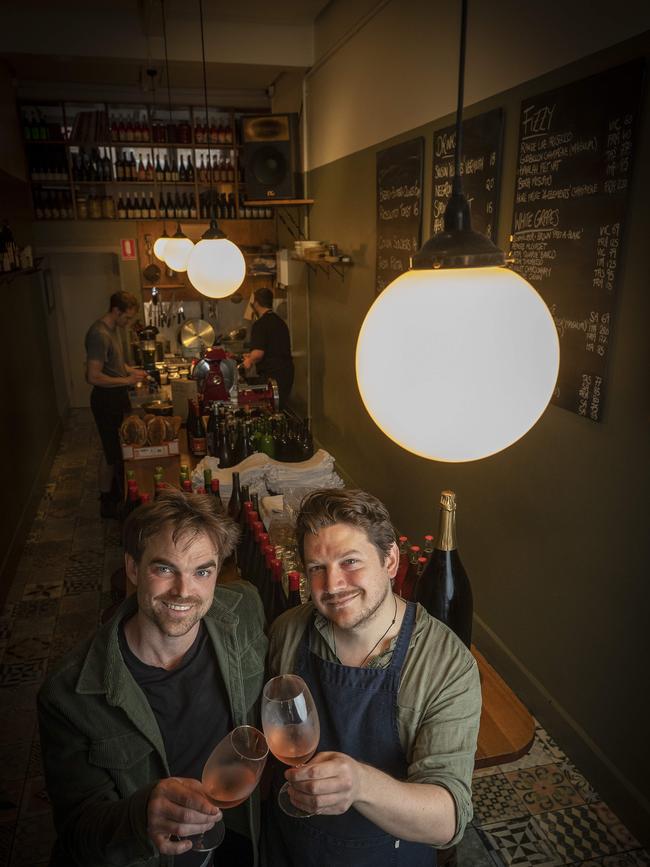
The influence of the growing precinct trend remains to be seen in Sydney’s inner-west nightlife hubs on King Street and Enmore Road. Independent owner-operator bars and restaurants continue to be a popular option for diners.
“We’re busier than ever, the Newtown-Enmore precinct is more vibrant than ever before too. Diners can feel the difference when it’s more organic and not pre-planned,” says Marc Russo, who opened Enmore Road favourite Osteria di Russo and Russo with his father, Pino, 12 years ago.
He believes independent venue operators “have more buy-in than groups who are not the owner-occupier”. While he recognises “certain opportunities, like staff training, arise from scale”, smaller venues attract a level of risk that necessitates creativity in an over-saturated dining industry.
“With diminishing profit margins in the hospitality sector we’re seeing more of a development model – you can buy the property, develop it and then create value from what you already own,” he says. “The reason why it’s probably not [as prevalent] in Newtown is that locals value these unique and quirky venues. There’s not many areas that exist with lots of independent restaurants next to one another.”
John Graham, NSW Minister for Music and the Night-time Economy, is hopeful that “Sydney is in the midst of a big comeback story” following the almost decade-long lockout laws aiming to reduce alcohol-related violence in Sydney’s CBD and Kings Cross, and the Covid-19 lockdowns. “[It] was incredibly damaging to our night-time economy and we’re working hard to turn that around.”
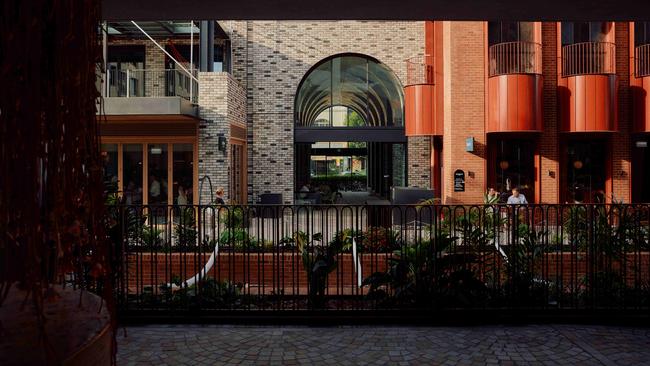
Along with increased funding programs for hospitality operators, the state’s first-ever 24-Hour Economy Commissioner, Michael Rodrigues, was appointed in 2021 to investigate the diversification of night-time activities. “Whether it be high-end or eat streets, dining precincts have a significant role to play in revitalising the state’s $102 billion a year night-time economy,” he says.
Beyond the economic impact on the hospitality industry, precinct culture – whether a string of independent restaurants down a busy road or a group-owned establishment – is all about creating the right ambience for diners to socialise. The more memorable the dining experience the better – by any means necessary.



To join the conversation, please log in. Don't have an account? Register
Join the conversation, you are commenting as Logout